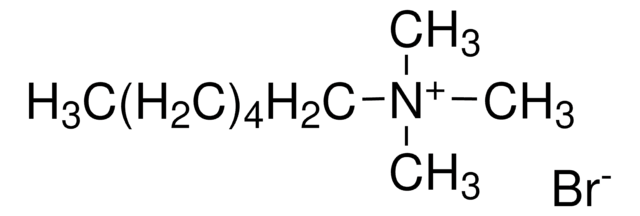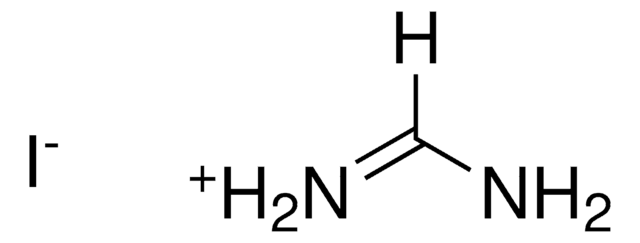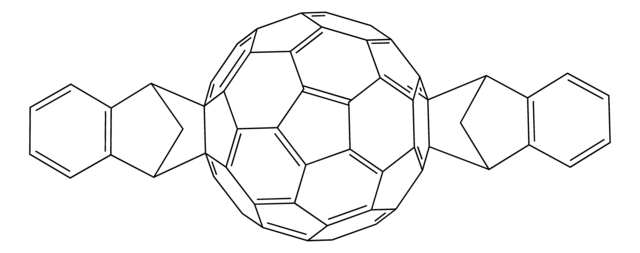912859
Di-isopropylammonium bromide
Synonym(e):
2-Propanamine, N-(1-methylethyl)-, DIPRAB, Greatcell Solar®, Hydrobromide (8CI) diisopropylammonium bromide, Hydrobromide (9CI) diisopropylamine
Anmeldenzur Ansicht organisationsspezifischer und vertraglich vereinbarter Preise
Alle Fotos(1)
About This Item
Empirische Formel (Hill-System):
C6H16BrN
CAS-Nummer:
Molekulargewicht:
182.10
MDL-Nummer:
UNSPSC-Code:
12352101
NACRES:
NA.23
Empfohlene Produkte
Verwandte Kategorien
Anwendung
Organohalide based perovskites have emerged as an important class of material for solar cell applications. The variations/substitution in organohalide cations and anions is employed for the optimization of the band gap, carrier diffusion length, and power conversion efficiency of perovskites based solar cells.
Rechtliche Hinweise
Product of Greatcell Solar Materials Pty Ltd.
Greatcell Solar is a registered trademark of Greatcell Solar Materials Pty Ltd.
Greatcell Solar is a registered trademark of Greatcell Solar Materials Pty Ltd.
Greatcell Solar is a registered trademark of Greatcell Solar
Lagerklassenschlüssel
11 - Combustible Solids
WGK
WGK 3
Flammpunkt (°F)
Not applicable
Flammpunkt (°C)
Not applicable
Analysenzertifikate (COA)
Suchen Sie nach Analysenzertifikate (COA), indem Sie die Lot-/Chargennummer des Produkts eingeben. Lot- und Chargennummern sind auf dem Produktetikett hinter den Wörtern ‘Lot’ oder ‘Batch’ (Lot oder Charge) zu finden.
Besitzen Sie dieses Produkt bereits?
In der Dokumentenbibliothek finden Sie die Dokumentation zu den Produkten, die Sie kürzlich erworben haben.
High Efficiency and High Open Circuit Voltage in Quasi 2D Perovskite Based Solar Cells.
Cohen B E, et al.
Advances in Functional Materials, 27(3), 1604733-1604733 (2017)
Lingling Mao et al.
Journal of the American Chemical Society, 139(14), 5210-5215 (2017-03-18)
Hybrid inorganic-organic perovskites are developing rapidly as high performance semiconductors. Recently, two-dimensional (2D) perovskites were found to have white-light, broadband emission in the visible range that was attributed mainly to the role of self-trapped excitons (STEs). Here, we describe three
Eran Edri et al.
The journal of physical chemistry letters, 4(6), 897-902 (2013-03-21)
Mesoscopic solar cells, based on solution-processed organic-inorganic perovskite absorbers, are a promising avenue for converting solar to electrical energy. We used solution-processed organic-inorganic lead halide perovskite absorbers, in conjunction with organic hole conductors, to form high voltage solar cells. There
Unser Team von Wissenschaftlern verfügt über Erfahrung in allen Forschungsbereichen einschließlich Life Science, Materialwissenschaften, chemischer Synthese, Chromatographie, Analytik und vielen mehr..
Setzen Sie sich mit dem technischen Dienst in Verbindung.



![[6,6]-Phenyl C61 Buttersäuremethylester >99.5%](/deepweb/assets/sigmaaldrich/product/structures/359/221/d990c746-0960-4c69-bf76-fe09b193824d/640/d990c746-0960-4c69-bf76-fe09b193824d.png)


![Poly-[bis-(4-phenyl)-(2,4,6-trimethylphenyl)-amin] a poly(triaryl amine) semiconductor](/deepweb/assets/sigmaaldrich/product/structures/122/933/c34a34ab-284f-4890-adb8-126247a91d9b/640/c34a34ab-284f-4890-adb8-126247a91d9b.png)

